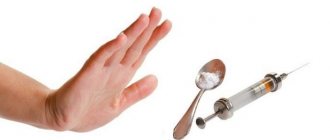Addiction
– this is a pathological need for something, an obsessive attraction.
A person strives for what gives him pleasure. The desire to fill your life with pleasure is a common feature that unites people prone to various addictions. But trying to prolong or intensify pleasure, a person falls into slavery from the object of his desires, loses freedom of action, loses will. And from some point on, pleasure turns into torment, and for those around you and loved ones it turns into a real nightmare.
Getting rid of addiction on your own, without the help of a specialist, is very difficult, almost impossible. After all, addiction is a real disease (in medicine, dependence is called addiction
).
Types of dependencies
Dependencies are divided into two large groups. These are chemical and non-chemical dependencies.
Chemical dependencies
The group of chemical addictions includes addictions to psychoactive substances, that is, substances that affect the activity of the central nervous system. A single use of such substances leads to a change in a person’s emotional and physical state, and repeated use causes the formation of mental and physical dependence.
Chemical addictions include alcohol, nicotine (tobacco) and drug addictions.
Alcohol addiction
Alcohol addiction
(alcoholism) is a disease that manifests itself as an addiction to alcohol with mental and physical dependence on it.
First, mental dependence develops. A person begins to resort to alcohol as the only means to relieve stress, cheer up, relax, get rid of fatigue after a hard day, and facilitate communication with others. People often see nothing wrong with the fact that alcohol becomes a means of first aid in various life circumstances. Up to a certain point, addiction to alcohol does not affect your health, work, or relationships with loved ones. Such a person is strikingly different from the “classic” image of an alcoholic - a subject with a blue nose, shaking hands, who has lost his job and prefers drinking, albeit with random drinking companions, to everything else. And on this basis, a person already addicted to drinking does not consider that there is any cause for concern.
Meanwhile, a restructuring of the human personality is gradually taking place. Priorities change. A person begins to look for a reason to drink, to strive for a place where this desire can be realized. The impending drink causes euphoria, and if the event fails, the mood drops to the point of depression. More and more money is being spent on alcohol.
Sensitivity to alcohol also changes. To achieve a drunken state now requires 2-3 times more alcohol. To achieve the desired state, a person changes drinks - he starts drinking stronger ones, often cheaper and of lower quality, because the taste component no longer matters.
The next stage is characterized by an irresistible desire to drink. The need for alcohol is already stronger than the need for food. Personality degradation continues. Without drinking, a person becomes aggressive and irritable. The euphoria achieved with alcohol quickly passes, and the dose required to get drunk increases even more. Headaches, heart problems and other disorders appear.
Further progression of alcoholism will lead to binge drinking and even greater personality destruction. Physical health problems will also increase.
Alcoholism is destructive to a family. It is estimated that one patient affected by alcoholism has a profound impact on the lives of at least four people. The reaction of family members to the behavior of a person with alcohol addiction is, as a rule, typical, and it can take its own pathological forms. As a result, the situation in the family worsens even more. The solution is to see a doctor (psychotherapist or narcologist).
In such situations, professional help is necessary for all family members. To treat alcohol addiction in modern medicine, various methods are used: drug therapy, a combination of drug and psychotherapeutic assistance, prohibitive techniques. It is also necessary to consult the patient's relatives - without this, it is extremely difficult to achieve long-term remissions and normalization of family relationships.
Drug addiction
Drug addiction
(drug addiction) is a chronic progressive disease associated with the use of narcotic substances.
The list of narcotic drugs is determined by law. If there is a dependence on a substance that is not included in the list of narcotic drugs, we talk about substance abuse
. The progression of drug addiction means that the disease is continuously developing: if the drug addict is left to his own devices, it will definitely get worse. Drug addiction treatment should not be delayed under any circumstances.
Drug addiction treatment is carried out only under the supervision of a psychiatrist-narcologist. Treatment should include mandatory further rehabilitation (restoration of lost functions).
Nicotine addiction
Nicotine addiction
(smoking) is a serious problem. Nicotine has a destructive effect on the human body. Quitting smoking can help a person maintain and improve their health, but quitting smoking is not so easy. It is known that for only 15% of smokers smoking can be considered only a habit; for 85% of smokers it is a nicotine addiction.
If a person decides to quit smoking, he can choose the most suitable method for combating nicotine addiction. Some people are able to give up cigarettes on their own, while others need to undergo treatment using one or another technique. This is all purely individual. The main thing is not the method, the main thing is the result: recovery from nicotine addiction. If you cannot cope with addiction on your own, you need to seek help from specialists (psychotherapist or narcologist).
The cause of the disease is treated, and it is different for everyone. Therefore, proper treatment of nicotine addiction requires an individual approach. The course of treatment, as a rule, includes a set of measures at both biological and psychological levels.
Non-chemical addictions
Recently, non-chemical addictions have become increasingly widespread: addiction to gambling or computer games, addiction to shopping, addiction to food.
Gaming addiction
Gambling addiction
(card addiction, etc.),
computer games
(gambling addiction) manifests itself in the form of a constant desire to participate in the game. More and more time is devoted to the game - to the detriment of work and ordinary communication. Even outside the gaming situation, a person suffering from gambling addiction constantly thinks about the game and plans game combinations. When playing for money, such a person is not able to stop even after a big win; It’s also difficult for him to stop after a series of big losses.
Gambling addiction goes through several stages: the winning stage, when a person is motivated to gamble by the desire to win; the stage of loss, when the main thing is the desire to win back; the stage of disappointment in which a person becomes depressed and completely falls out of normal life. The earlier treatment is started, the easier it will be to cope with addiction. It is extremely difficult to cope with gambling addiction on your own; To get rid of gambling addiction, you need to seek help from a specialist (psychotherapist or psychiatrist-narcologist).
Shopping addiction
Shopping addiction
– this is an uncontrollable desire to make more and more new purchases. In principle, any successful purchase brings pleasure. Quite often there are advertisements calling for pleasure by buying a new thing. As a result, a behavioral stereotype arises: if you want to improve your mood, buy something. Such behavior becomes pathological when the act of buying itself turns out to be more important than the thing being purchased. The number of unnecessary purchases is growing; An increasing share of the personal or family budget is spent on shopping, so much so that it begins to affect other aspects of life.
In order to overcome addiction, you need the help of a specialist. A psychotherapist must find out the real reasons that force a person to seek solace in shopping. As a rule, these are serious intra-family or personal problems.
Food addiction
Food addiction
(food addiction) manifests itself in eating food regardless of the feeling of hunger. That is, a person eats when he is full. The motivation for eating is the desire to enjoy (cheer up). This is how, for example, a reaction to stress can be expressed: a person tries to “seize” bad emotions.
Indeed, food can bring pleasure. However, if a person tries to pamper himself with abundant and tasty food all the time, addiction develops: the person eats more and more, but receives less pleasure. Food addiction leads to obesity. Excess weight reduces a person’s self-esteem; these are again bad emotions that a person fights in the usual way, that is, with food.
It is almost impossible to get out of this vicious circle on your own. The task of overcoming food addiction must be solved comprehensively, for which both medication and psychotherapeutic techniques are used. Treatment is carried out by a psychotherapist or narcologist with the participation of an endocrinologist. A competent approach involves not only treating the consequences of overeating, but also eliminating the causes of obesity.
Emotional addiction
Emotional addiction
is an obsessive need for another person. A dependent person perceives the value of his relationship with another as critical; it seems to him that his whole life consists of these relationships. When stressed or anxious, such a person feels the need for contact with a loved one, and if this is impossible, his emotional state worsens. Emotional dependence destroys both the personality of the one who suffers from it and the relationship itself, since they often become burdensome to the object of his love.
How does drug addiction occur?
Dependence develops due to the specific structure of the drug. Its ability to influence the brain leads to a feeling of euphoria, and also affects other organs and systems, causing the onset of physical dependence.
After short-term use, the drugs are actively integrated into normal metabolism. Drugs replace compounds synthesized by the body. Substances affect metabolic processes in such a way that cells lose the ability to interact productively without the drug. Provided that the patient’s body does not receive the next dose, withdrawal syndrome develops.
At a time when the body does not receive the psychoactive drug, the patient becomes irritable, feels weak, and feels pain. The patient cannot stop taking such substances on his own, so you should immediately contact.
Addiction Treatment Methods
The first step in treating addiction is realizing your own lack of freedom. A person must admit that he is a victim of habit, that it is not he who controls himself, but addiction that manipulates him. Only then will there be a desire to restore one’s personal sovereignty, a desire to overcome dependence, on which both the doctor and the person himself can rely.
The second step is to contact a specialist: a psychiatrist (psychiatrist-narcologist) or psychotherapist. When choosing a doctor, you need to focus on the doctor’s professionalism and experience. Treatment of addictions requires special medical training (education). You should not be guided by the first random information - you may encounter quackery; You should make sure that the doctor is qualified. It is also very important that you can trust your doctor. Without a trusting relationship with your doctor, overcoming addiction will be very difficult.
Specialist consultation
At JSC “Family Doctor” you can get help from highly qualified psychotherapists who have significant experience in successfully recovering from addictions and achieving long-term remissions. Classes are conducted individually and in groups.
Make an appointment Do not self-medicate. Contact our specialists who will correctly diagnose and prescribe treatment.
Rate how useful the material was
thank you for rating
How can you tell if addiction is developing in a relationship?
The main signs can be noticed at the very beginning of the development of this pathology. In the early stages, coping with it is quite simple, and it is not at all necessary to separate from your partner.
What are these “alarm bells”? Psychologists recommend thinking about the nature of a relationship with a man if it contains the following:
- a sharp loss of interest in what is happening around, a change in one’s own habits and tastes;
- panic fear of separation, the thought of such a possibility terrifies;
- aggression towards people who criticize a partner or consider the relationship not particularly successful;
- idealization of a man, forgiveness and justification of any of his actions;
- severe mood swings;
- the desire not to be separated for a second.
Of course, these signs are also characteristic of intense love. Accordingly, having discovered their presence in your relationship, you do not need to get upset and resort to any drastic measures. And of course, we must not forget that before you get rid of your addiction to a man, you need to make sure that it exists. Otherwise, you can lose true love and become lonely and unhappy.
If prevention is too late
If it is obvious that prevention is too late, immediate measures should be taken to cure chemical dependence. Explanatory conversations are pointless while the addict is experiencing physical suffering, so the first thing you need to do is alleviate it. This is what doctors think, first of all relieving the patient’s withdrawal symptoms. And only after this does psychological rehabilitation begin, consisting of several stages.
The dependent must:
- accept the fact of illness, realizing that you have no control over your actions;
- realize that he needs to change;
- determine the direction of change with the help of specialists;
- start implementing these changes.
Psychological rehabilitation takes a lot of time - depending on how far the disease has gone, and on the desire and readiness of the patient to go through this path, his determination not to return to the vicious circle. The next stage of rehabilitation is social, when a person has to revive broken relationships in the family: adapt to the demands of loved ones, first return partnerships, and then the previous trusting relationships. It will not begin until the patient gains confidence that he will no longer make his relatives suffer by experiencing family addiction.
Next is the spiritual stage of rehabilitation. By and large, it can last a lifetime.
Of course, this is a difficult path that an addict cannot do on his own or even with the help of his family. Our specialists, using an integrated approach, will help you free yourself from all types of chemical dependency.
The mechanism of development of love addiction
The mechanism of development of love addiction is very similar in its stages to the mechanism of development of chemical dependence in alcoholics and drug addicts. First, the stage of intoxication occurs - a person falls in love, experiences attraction, euphoria, delight that he is loved. Then comes the hangover stage and the desire to increase the dose - since some addiction has already occurred and an increase in the dose of love is required in order to get hooked, as in the first stage. Then comes the third stage, which is similar to withdrawal syndrome. This is the fear of losing a partner, and this is where the following phrases come from: “I can’t live without him” or “If he leaves, I will die.” The addict clings to the “beloved” like a drowning man clings to a straw. This is like the last chance in his life. And he does this because the need for care and love in an addicted person is greatly exaggerated, but at the same time cannot be satisfied. This state can be compared to a leaky barrel that you constantly fill, but it is simply impossible to fill it to the top. Also, the addict’s need for love and happiness cannot be satisfied with the help of someone or something.










